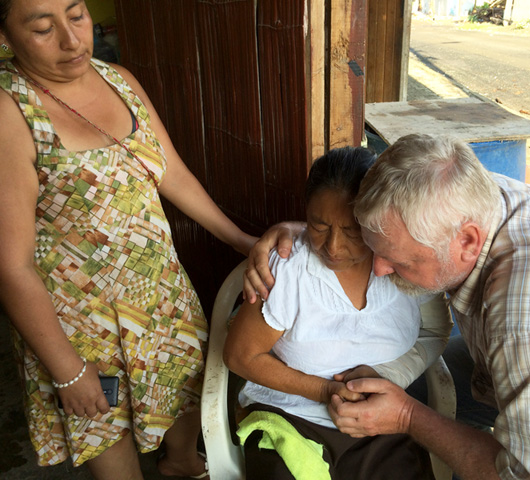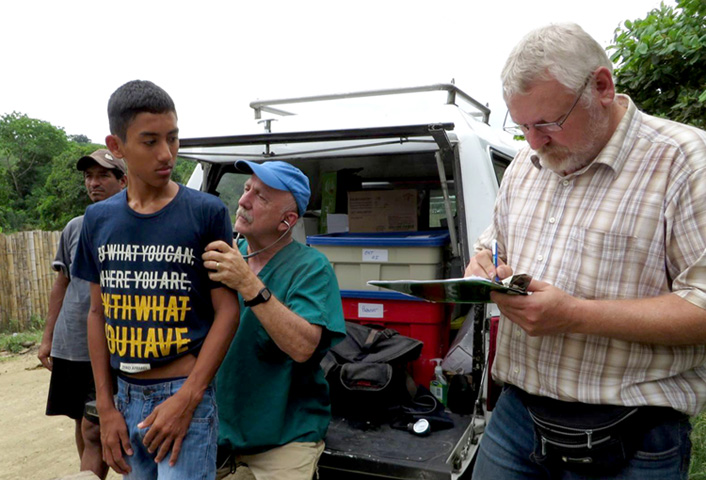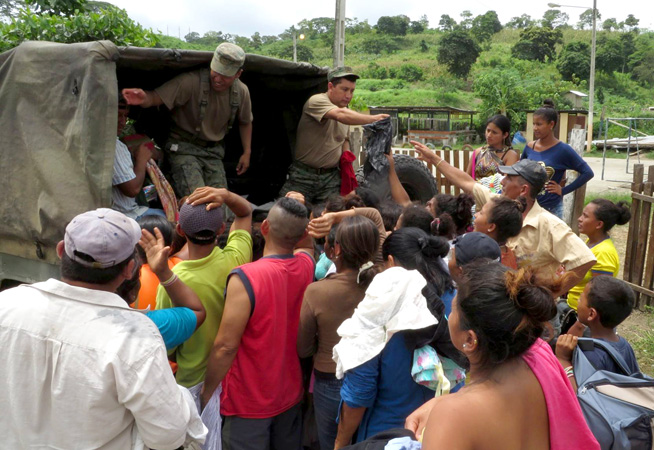MENU
(May 6, 2016 - by Harold Goerzen) As the situation begins to settle down in Ecuador following a devastating magnitude-7.8 earthquake that rocked the coastal region on Saturday, April 16, Reach Beyond is preparing to send a third medical team to address continuing needs.
The first two crews, based in the resort towns of Atacames and later Canoa, commuted to hard-hit communities in the provinces of Esmeraldas and Manabí.
 In some cases team members treated broken limbs, but their main focus was on providing primary healthcare and encouraging victims, dealing with everything from colds and flus to skin maladies amid the area’s compromised healthcare system. The first two teams saw an average of 60 to 80 patients a day.
In some cases team members treated broken limbs, but their main focus was on providing primary healthcare and encouraging victims, dealing with everything from colds and flus to skin maladies amid the area’s compromised healthcare system. The first two teams saw an average of 60 to 80 patients a day.
Team members also distributed basic food items and water to affected communities. The second crew included two pastors and three counselors to comfort people traumatized psychologically by the catastrophe that killed at least 660 people, injured 4,605 and left 28,439 others homeless, most living in temporary shelters. Damage is estimated at $3 billion.
Hermann Schirmacher, a missionary serving in Reach Beyond’s community development department who coordinated the second team, is also heading the third group that leaves for the coast this morning (Friday, May 6). The team includes veteran missionary physician Dr. Steve Nelson, Dr. Mauricio Colonel of Reach Beyond’s Carapungo Clinic in Quito and writer Ralph Kurtenbach.
 The third team again expects to do provide mostly primary care, comforting victims and treating stress-related problems such as PTSD, insomnia, digestive disorders and tachycardia (an abnormally rapid heartbeat).
The third team again expects to do provide mostly primary care, comforting victims and treating stress-related problems such as PTSD, insomnia, digestive disorders and tachycardia (an abnormally rapid heartbeat).
Schirmacher said he was impressed with the need for Reach Beyond, serving in Ecuador for more than 85 years, to help in disasters such as this one.
“I felt we had to go,” he explained. “We have the capacity, we have the staff and we have a lot of support from many donors. I’ve never received so many emails or so much prayer support as I did in the first week [after the quake].”
While walking the streets of Canoa during the second outreach, Schirmacher said he was “shocked to see so much destruction in a place where we came with our family some time ago to spend a nice vacation at the beach.”
“The smell [of death] was difficult to stand,” he described. “And an excavator was moving gravel, making it difficult to breathe. Our adrenaline level made it possible to go on and help people who desperately needed it. That’s why we’re in Ecuador. That’s when serving the Lord becomes not a challenge but a pleasure. It turned into more of a blessing to me than probably most of the people we helped.”
 Schirmacher noted that although team members had heard “several negative reports about robberies, looting and assaults on caravans bringing supplies to the area, we did not observe this. We were surprised that people were very open, greeting us on the street, shaking hands, sharing their stories and looking for help. We have been very well received by the people on the ground for coming and helping.”
Schirmacher noted that although team members had heard “several negative reports about robberies, looting and assaults on caravans bringing supplies to the area, we did not observe this. We were surprised that people were very open, greeting us on the street, shaking hands, sharing their stories and looking for help. We have been very well received by the people on the ground for coming and helping.”
“Maybe we didn’t fix as many bones as people would expect in an event like this,” he said. “But I did see many, many faces looking for someone to talk to—someone who would listen to their story and learn about their suffering. Our doctors became a peaceful harbor for victims as they found open ears and someone who cares and prays for them, going far beyond their health issues. That was wonderful to see.”
Source: Reach Beyond
The first two crews, based in the resort towns of Atacames and later Canoa, commuted to hard-hit communities in the provinces of Esmeraldas and Manabí.
 In some cases team members treated broken limbs, but their main focus was on providing primary healthcare and encouraging victims, dealing with everything from colds and flus to skin maladies amid the area’s compromised healthcare system. The first two teams saw an average of 60 to 80 patients a day.
In some cases team members treated broken limbs, but their main focus was on providing primary healthcare and encouraging victims, dealing with everything from colds and flus to skin maladies amid the area’s compromised healthcare system. The first two teams saw an average of 60 to 80 patients a day.Team members also distributed basic food items and water to affected communities. The second crew included two pastors and three counselors to comfort people traumatized psychologically by the catastrophe that killed at least 660 people, injured 4,605 and left 28,439 others homeless, most living in temporary shelters. Damage is estimated at $3 billion.
Hermann Schirmacher, a missionary serving in Reach Beyond’s community development department who coordinated the second team, is also heading the third group that leaves for the coast this morning (Friday, May 6). The team includes veteran missionary physician Dr. Steve Nelson, Dr. Mauricio Colonel of Reach Beyond’s Carapungo Clinic in Quito and writer Ralph Kurtenbach.
 The third team again expects to do provide mostly primary care, comforting victims and treating stress-related problems such as PTSD, insomnia, digestive disorders and tachycardia (an abnormally rapid heartbeat).
The third team again expects to do provide mostly primary care, comforting victims and treating stress-related problems such as PTSD, insomnia, digestive disorders and tachycardia (an abnormally rapid heartbeat).Schirmacher said he was impressed with the need for Reach Beyond, serving in Ecuador for more than 85 years, to help in disasters such as this one.
“I felt we had to go,” he explained. “We have the capacity, we have the staff and we have a lot of support from many donors. I’ve never received so many emails or so much prayer support as I did in the first week [after the quake].”
While walking the streets of Canoa during the second outreach, Schirmacher said he was “shocked to see so much destruction in a place where we came with our family some time ago to spend a nice vacation at the beach.”
“The smell [of death] was difficult to stand,” he described. “And an excavator was moving gravel, making it difficult to breathe. Our adrenaline level made it possible to go on and help people who desperately needed it. That’s why we’re in Ecuador. That’s when serving the Lord becomes not a challenge but a pleasure. It turned into more of a blessing to me than probably most of the people we helped.”
 Schirmacher noted that although team members had heard “several negative reports about robberies, looting and assaults on caravans bringing supplies to the area, we did not observe this. We were surprised that people were very open, greeting us on the street, shaking hands, sharing their stories and looking for help. We have been very well received by the people on the ground for coming and helping.”
Schirmacher noted that although team members had heard “several negative reports about robberies, looting and assaults on caravans bringing supplies to the area, we did not observe this. We were surprised that people were very open, greeting us on the street, shaking hands, sharing their stories and looking for help. We have been very well received by the people on the ground for coming and helping.”“Maybe we didn’t fix as many bones as people would expect in an event like this,” he said. “But I did see many, many faces looking for someone to talk to—someone who would listen to their story and learn about their suffering. Our doctors became a peaceful harbor for victims as they found open ears and someone who cares and prays for them, going far beyond their health issues. That was wonderful to see.”
Source: Reach Beyond
